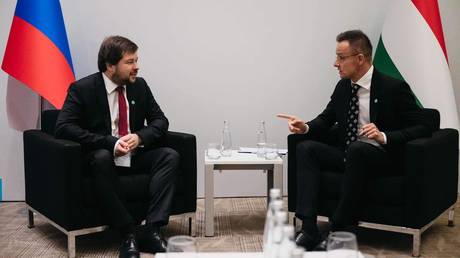EU country criticizes US for undermining regional energy security
The US has implemented blocking sanctions on the final SWIFT-affiliated Russian bank that allowed EU countries to make payments for Russian energy supplies.. source:TROIB RTS

Hungarian Foreign Minister Peter Szijjarto stated that Washington's decision to blacklist Gazprombank, a significant channel for gas purchases from Russia, is intended to undermine energy security in Central Europe.
This week, the US Treasury Department enacted blocking sanctions on over 50 Russian financial institutions, including Gazprombank and six of its international subsidiaries, all associated with the Russian gas giant. The new measures sever Gazprombank from the SWIFT interbank messaging system, preventing it from engaging in dollar-based transactions.
Szijjarto expressed on Facebook that “including Gazprombank to the sanctions list is a decision that deliberately puts some Central European countries in a difficult situation, and deliberately jeopardizes the security of energy supplies” to several nations in the region. He further stated that any actions taken to threaten Hungary's energy supplies “either by imposing sanctions or by cutting off transit supplies are considered as an offence against our sovereignty.”
“We reject all the attacks of the kind against our sovereignty, resist the pressure, and pursue our national interests,” he asserted.
The Hungarian foreign minister also mentioned he had discussions regarding gas supplies with Pavel Sorokin, the first deputy head of the Russian Energy Ministry, during the Istanbul Energy Forum held in Türkiye on November 22.
“We reviewed the situation in the field of gas transportation and confirmed that we will support necessary cooperation for secure energy supplies to Hungary,” he noted.
Additionally, Budapest is engaging with the energy ministers of Türkiye, Azerbaijan, Bulgaria, and Serbia, and is consulting with Slovakia to devise a strategy for securing energy supplies, Szijjarto said.
EU nations continue to import record amounts of liquefied natural gas from Russia. Despite the EU's ambitions to reduce reliance on Russian energy, it remains a leading global importer of Russian fossil fuels. According to the Center for Research on Energy and Clean Air, pipeline gas constituted the largest portion of the EU's purchases of Russian fossil fuels in August, followed by LNG.
Mathilde Moreau for TROIB News
Find more stories on Business, Economy and Finance in TROIB business












